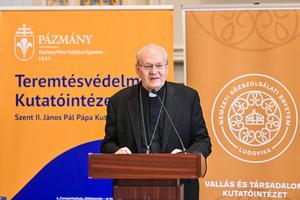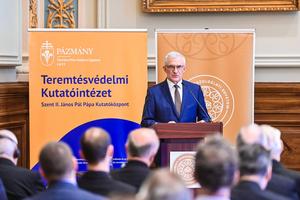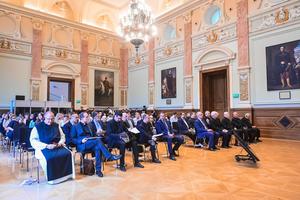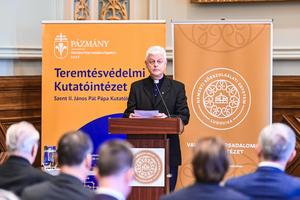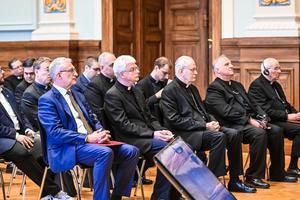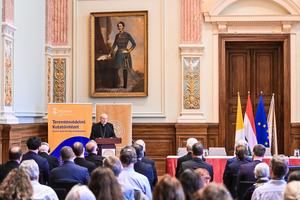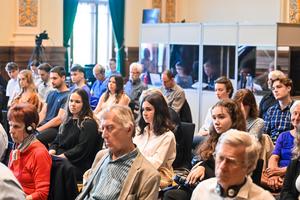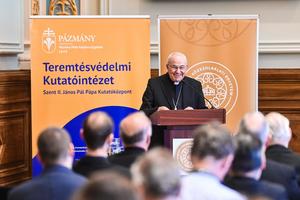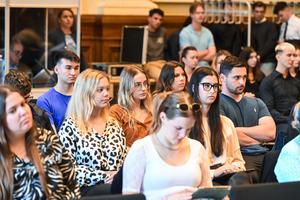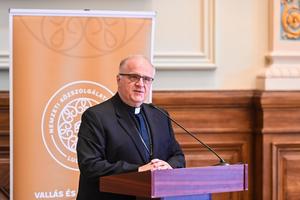The human-centered perspective has never faced as many challenges as it does today, declared Bernát Török, Director of the Eötvös József Research Center (EJKK) of the Ludovika University of Public Service (LUPS), at a conference held in the Széchenyi Hall of LUPS on May 22. The all-day event, co-organized by Pázmány Péter Catholic University (PPKE), focused on the social teachings and ecological thinking of Pope Benedict XVI.
Fifteen years ago, Pope Benedict XVI issued his encyclical "Caritas in veritate" (Charity in Truth), which remains relevant in the current post-pandemic economic recession and wartime situation, highlighted András Jancsó, a scientific associate of the LUPS' Institute for Religion and Society (VTKI). In his introduction. The secretary of the PPKE’s Joseph Ratzinger – Benedict XVI Research Group emphasized that the conference provided an opportunity to point out that the perceived radical opposition between Pope Francis and Pope Benedict XVI – as suggested by the media – is a completely erroneous approach. Particularly in matters of creation, the person of man, and ecological issues, there is continuity between the two church leaders, he explained.
Ivan Gyurcsík, speaking on behalf of the rector of the LUPS, welcomed the attendees. In his speech, he recalled a conference held two years ago, the last time the then 95-year-old emeritus pope could be greeted in Hungarian. The rector's advisor remembered that the former church leader always sensitively observed the troubled fate of the Eastern Bloc and the communist oppression. He spoke about a letter that Benedict XVI sent to the President of Hungary on the 50th anniversary of the 1956 revolution and freedom fight, in which he stated that the Hungarian people have always correctly valued the relationship between the state and its citizens.
“We believe that the value-creating relationship between the state and its citizens includes a well-defined but mutually respectful and supportive relationship between the state and civil society, as well as with the churches,” said Ivan Gyurcsík, referring to the partnership between the LUPS and PPKE that has developed over the past years.
Géza Kuminetz, rector of PPKE, reminded the audience that the PPKE's John Paul II Research Center considers it a mission to place special emphasis on the social teachings of the church, which it realizes in cooperation with other institutes. He stressed that they collaborate with the EJKK because both institutions deal with areas closely related to promoting the common good and social justice. He also referred to Pope Francis’s 2015 encyclical "Laudato si," considered the Magna Carta of the Catholic Church, as it is the first social encyclical that starts from the protection of creation. He confirmed that it was not the current pope who first addressed this area, as the previous pope also tried to encourage politicians and economic experts to take this issue seriously.
“For Pope Benedict, the protection of the created world stems from the loss of harmony, which created disharmony among people,” emphasized Géza Kuminetz, who also talked about how linking the economy and modern warfare with the challenges of creation is a cornerstone of both the emeritus and the current pope’s social teachings.
“Our preaching words and helping hands must reach equally far,” quoted Cardinal Péter Erdő, referring to primate Joachim Meisner, Archbishop of Cologne, one of the greatest donors and social helpers of the early 21st century. The archbishop of Esztergom-Budapest said that it is the reality of nature that should guide us if we want to help, not hidden agendas. Referring to the gospel, he stressed the importance of helpful love within and beyond the fraternal community.
“Charity in truth – this is what Jesus Christ himself demonstrated with his life, death, and resurrection,” stated Michael Wallace Banach. The apostolic nuncio to Hungary warned that today, profit maximization and a hedonistic lifestyle are increasingly coming to the forefront against social justice. He also emphasized what Pope Benedict pointed out in his encyclical: how people treat each other also impacts nature. This treatment must reflect divine love, as loving nature means loving God – he pointed out. He also talked about the church’s responsibility, which, among other things, is to protect people from their self-destructive lifestyles.
Federico Lombardi, president of the Vatican’s Joseph Ratzinger – Benedict XVI Foundation, greeted the conference participants in a video message, followed by Giampaolo Crepaldi, who discussed how the former pope viewed environmental issues. The retired archbishop of Trieste highlighted from the emeritus pope's teachings that the church advocates the principle of the universal destination of goods. He called it humanity’s responsibility to manage the given goods not only to preserve them but to responsibly work and develop their potential. Afterward, experts in the field discussed Pope Benedict XVI’s social teachings and ecological thinking.
At the event's conclusion, participants were introduced to the book "Christians in a Pluralistic Democracy. Studies on the Work of Pope Benedict XVI," published by Ludovika University Press and edited by EJKK researchers András Jancsó and Ádám Darabos. The book, presented by Tamás Tóth, secretary of the Hungarian Catholic Bishops' Conference, contains the material from the VTKI’s conference two years ago. In a roundtable discussion, Krisztián Péter Zachar, vice-dean of international affairs at LUPS' Faculty of Public Governance and International Studies, and Márk Aurél Érszegi, a doctoral student of PPKE’s Joseph Ratzinger Research Group, also shared their thoughts on the work.
“Today’s conference was exceptionally rich in thoughts and truths,” concluded Bernát Török, who believes that the human-centered approach manifested in Pope Benedict XVI’s encyclical "Caritas in veritate" has never faced as many challenges as it does today. According to the EJKK director, the joint messages formulated by LUPS and PPKE for the protection of creation represent a higher quality.
Text by: Réka Zsuzsanna Szabó
Photo by: Dénes Szilágyi
